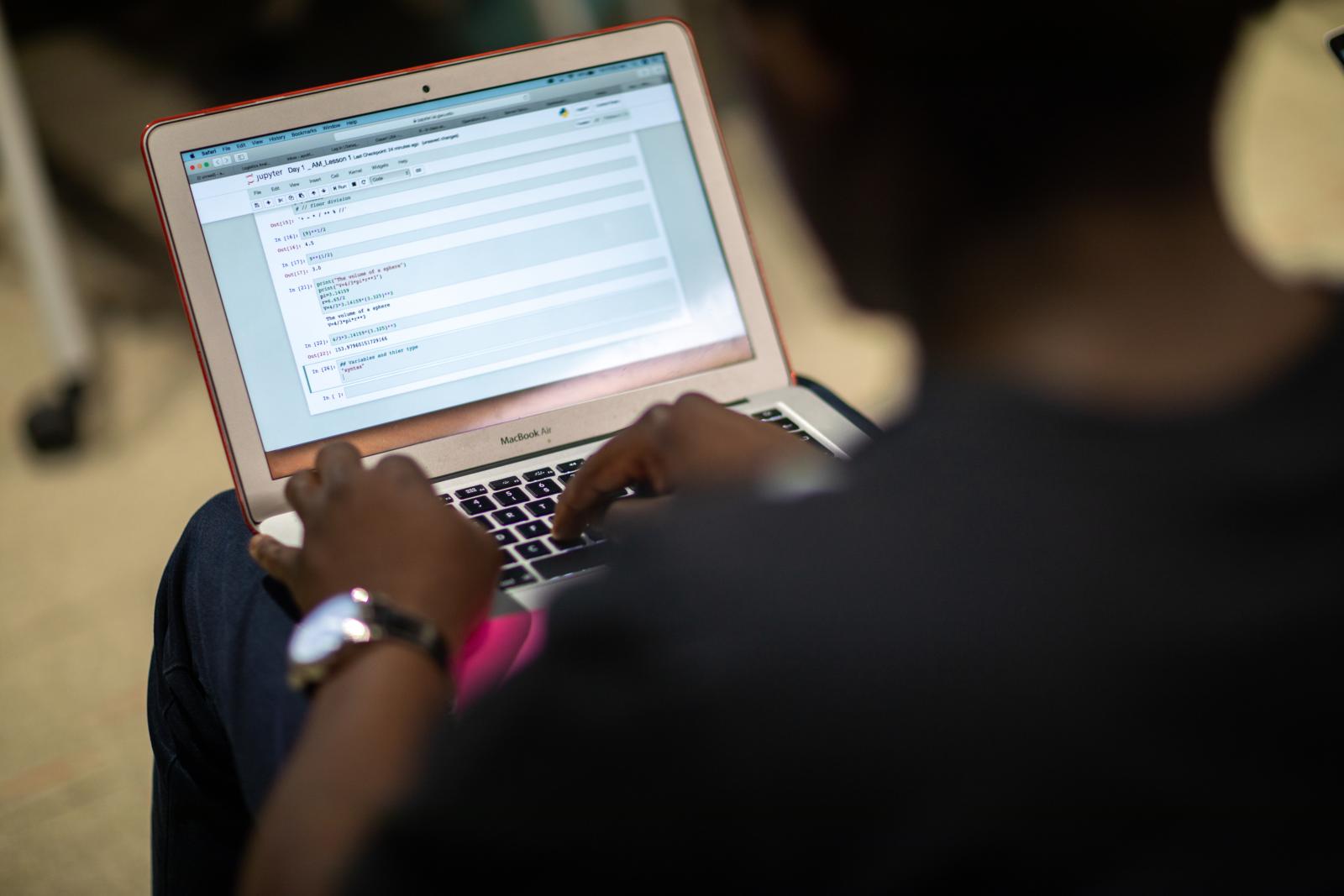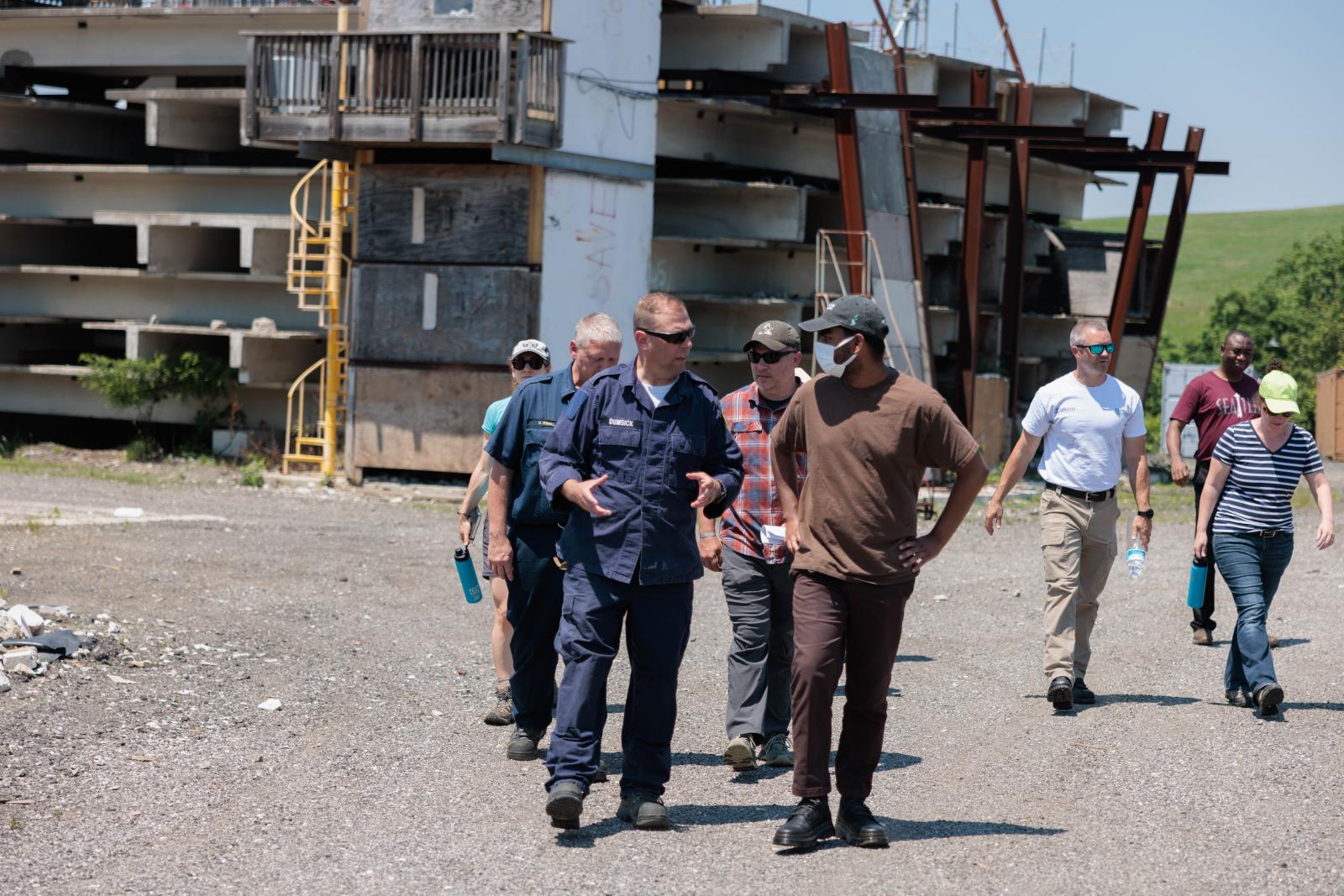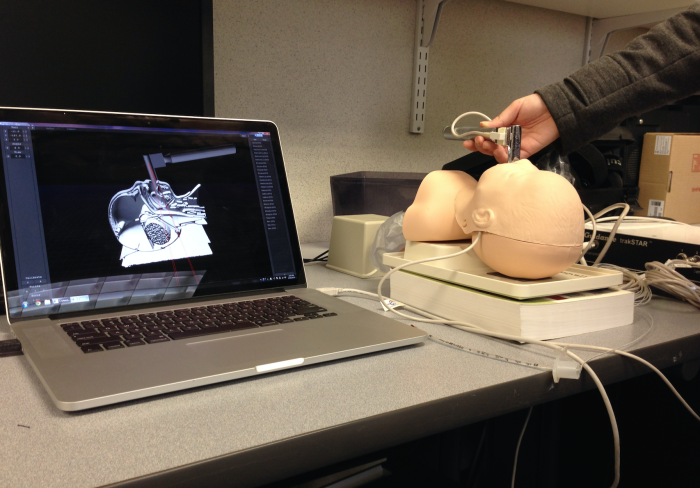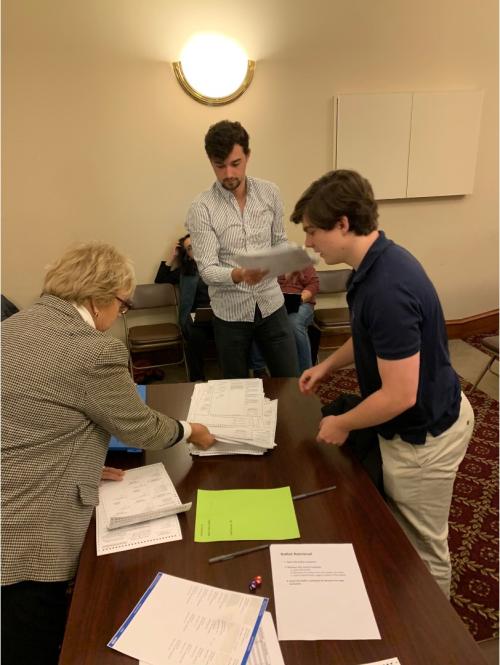Revolutionizing the Way We Live, Work, and Learn through “Engineering AND ....”
LETTER FROM THE DEPARTMENT CHAIR
Technology is a catalyst for our rapidly evolving world. At GW’s School of Engineering and Applied Science, we make it our mission to positively impact society through the philosophy of “Engineering and ...,” which puts interdisciplinary collaborations at the forefront of our research and educational activities within the Department of Computer Science. In this brochure, we share some of our proudest moments in the past year when our faculty and students’ work integrated technology, healthcare, security, and more.
A cross-cutting theme of our faculty and students’ work is improving equity in technological access. This can be seen in both the AI-oriented research of Prof. Robert Pless’s group, which aims to ameliorate the shortage of medical professionals in Nigeria by integrating large language models into clinical workflows, and the security-oriented project of graduate student Collins Munyendo, whose work focuses on the unique cybersecurity needs of cybercafe users in Kenya. These collaborations across disciplines and communities worldwide demonstrate the positive, transformational power of computer science.
At the undergraduate level, our students also embody this interdisciplinary spirit, as seen in their participation in the Autonomous Vehicle Competition. By collaborating with peers from other engineering disciplines, they develop practical solutions that fuse technical expertise with creativity and problem-solving.
Another key focus for the department is cybersecurity, with Prof. Sibin Mohan’s research on autonomous systems and Prof. Arkady Yerukhimovich’s leadership in cryptography and the GW CyberCorps Program playing key roles. These efforts in both research and education prepare the next generation of cybersecurity experts, including students benefiting from NSF and DoD-funded scholarships. Complementing this focus, new faculty members Profs. Shi Feng and Jie Zhou bring cutting-edge expertise in developing safe and secure computer and AI systems.
We invite you to explore how “Engineering and ...” is shaping the future, blending computer science with diverse fields to create meaningful, real-world impact.
Rebecca Hwa, Ph.D.
Professor and Chair
Department of Computer Science
School of Engineering and Applied Science
The George Washington University
TAILORING COMPUTER SECURITY AND PRIVACY SOLUTIONS FOR UNDERSERVED USERS
In today’s digital world, security and privacy threats are worldwide, yet much research tackling them reflects a Western perspective. Recognizing the inequalities this focus perpetuates, the CS Department is expanding traditional research paradigms to better serve and protect all online, exemplified by doctoral student Collins Munyendo’s award-winning work on the unique challenges faced by Kenyan cybercafe users.

As Kenya digitizes essential services, cybercafes have become popular internet access points. Munyendo notes that his firsthand experience living in Kenya and visiting cybercafes played a vital role in designing the study and recruiting suitable participants. Through semi-structured interviews with users and managers, he uncovered shared challenges among users, including general computer use and password selection.
Munyendo found that users often seek advice from cybercafe employees, who suggest memorable passwords like national ID numbers, which are easy to guess if bad actors can access their personal information. He recommends alternative methods of authentication better suited to these users’ needs, such as password- less options, along with government-provided computer training and security awareness.
By focusing on Kenyan cybercafe users, Munyendo showcases the department’s commitment to ensuring technological advancements benefit all communities. His recommendations not only enhance internet safety in Kenya but also emphasize the need to broaden computer security and privacy research beyond Western contexts for a more equitable digital future.
FRESH FACES, GROUNDBREAKING RESEARCH
Faculty in the CS Department embrace the transformative role of computer science in society, conducting high-impact research that addresses technical and societal complexities while challenging students to do the same. Meet GW Engineering’s new minds shaping the future of technology and security, Assistant Profs. Shi Feng and Jie Zhou.

Dedicated to leveraging artificial intelligence (AI) for the greater good, Feng is at the forefront of AI safety research. His work aims to empower human oversight and inform policy decisions, focusing on the safe deployment of AI systems that could surpass human capabilities. He designs innovative theories, algorithms, and user interfaces to augment human decision-making with and around AI technologies, with recent work investigating the safety risks of using LLMs to support human evaluation and supervision of LLM systems.

To transform the design and development of computer systems, Zhou’s research focuses on building secure computing systems through principled and rigorous methodologies. He leverages compiler-aided, language- based, and program analysis technologies to enhance the security of systems programming languages and their supporting ecosystems. By championing the philosophy of “building security in,” he advocates for integrating security measures directly into software systems during development rather than retrofitting them after production.
CREATING TRUSTWORTHY AI SYSTEMS TO ENSURE EQUITY IN THE REAL WORLD
Artificial Intelligence (AI) is becoming more deeply integrated within all parts of modern society, driving advances in science, engineering, the workforce, transportation, and social interaction. This integration creates a tension between the opportunities for ubiquitous AI to transform our world and the emergent risks around bias, security and privacy that arise.
GW Engineering will play a leading role in developing the next generation of AI algorithms and systems and build an understanding of how those systems can be best integrated within society. Ph.D. fellows from GW’s Designing Trustworthy AI Systems (DTAIS) program are gaining firsthand knowledge about convergent problems in artificial intelligence and machine learning.
DTAIS is an NSF Research Traineeship (NRT) administered by the GW departments of Computer Science and Engineering Management and Systems Engineering. Our NSF funding allows us to support full-time Ph.D. students pursuing critical research that lies outside the bounds of traditional disciplines. At the same time, DTAIS remains committed to innovative modes of instruction, interdisciplinary education and broadening STEM education to communities typically excluded from participation. DTAIS also offers a graduate certificate on Trustworthy AI for Decision Making Systems for students and professionals to gain the competency needed to address questions in this space and lead initiatives at their organizations.
The DTAIS community brings together dedicated students, faculty and professionals to shape our relationship to AI and the workplace of tomorrow. Our students receive mentorship from professors across campus and experts in industry, and our academic and professional partners gain access to passionate early researchers eager to make a difference.
PROTECTING AUTONOMOUS CYBER- PHYSICAL SYSTEMS IN REAL-TIME
Professors Sibin Mohan, Timothy Wood, and Gabriel Parmer lead pioneering research teams dedicated to addressing critical challenges in autonomous systems and cyber-physical systems (CPS). As the world increasingly relies on autonomous technologies, the demand for security, resiliency, and efficiency in these systems has reached unprecedented levels. Their collaborative endeavors are centered on fortifying autonomous systems against vulnerabilities, achieved through enhancing the underlying operating systems and networks to better cater to their stringent requirements.
The emergence of autonomous systems, ranging from IoT-style devices to UAV swarms, has ushered in a new era of technological progress. However, security remains a vital yet often underestimated challenge within this wave of innovation. Professor Sibin Mohan’s research endeavors to reinforce the resilience and security of Cyber-Physical Systems, while also paving the way for innovative approaches to secure cloud computing. His recent NSF CAREER award supports the development of secure safety-critical systems, preventing real-time information leakage. His work ultimately seeks to simultaneously improve real-time guarantees and security for autonomous systems.
Meanwhile, Professor Gabriel Parmer’s research is concentrated on advancing component- based operating systems and efficient serverless platforms. These systems empower fine-grained control and predictability in cloud-scale and embedded systems. Prof. Parmer and his students were honored with the Best Student Paper Award at RTSS 2023 for their contributions to OS support in multi-tenant edge environments. Their work pushes the boundaries of real-time systems, offering robust performance guarantees without compromising resource efficiency.
Professor Timothy Wood’s contributions span operating systems and networking, with a particular focus on edge computing. As the shift toward 5G-based edge clouds gains momentum, his research addresses the challenge of efficiently accommodating diverse applications while ensuring isolation and consolidation at the edge. In their recent projects funded by the NSF CPS program, the Semiconductor Research Corporation, and the Office of Naval Research, Professors Wood and Parmer have designed innovative edge computing platforms optimized for low latency and robust isolation, achieving up to a 10,000x reduction in cold start delays compared to container-based systems.
Together, the systems research team at George Washington University is working at one of the most challenging frontiers of computer science. Their work in security, resiliency, and efficiency is laying the foundation for safer and more reliable autonomous technologies, while meeting the stringent requirements of cyber-physical systems and working within the tight resource constraints of edge environments.
REACHING ACROSS DISCIPLINES TO SOLVE PROBLEMS IN HEALTHCARE WITH DIGITAL SOLUTIONS
Barriers between disciplines prevent the creation of novel solutions for real-world problems. The Institute for Innovation in Health Computing (ICG), led by Professor James Hahn, reaches across disciplines to overcome these barriers and solve challenging problems in healthcare using innovative digital solutions. Thus, ICG represents the diverse research interests of its members, who come from the Mechanical and Aerospace Engineering and Computer Science fields and a wide range of medical areas such as Radiology, Psychology, Surgery, etc. The interdisciplinarity of the Institute enables researchers from the problem-rich field of medicine to interact with solution-rich disciplines in engineering and computer science.
Prof. Hahn and his team have two active R01 grants from the National Institutes of Health. The first combines 3D body surface scanning technology and machine learning to develop an inexpensive and noninvasive way to assess the health of highly obese individuals, explicitly focusing on fat build-up in the liver. They recruited 250 patients undergoing weight-loss surgery to participate in this study and found that body shapes from optical scanners do provide valuable information about the medical condition of the subject.
The second addresses the low success rates for early-career physicians in performing the difficult and time-sensitive neonatal endotracheal intubation procedure. To reverse this trend, they designed an augmented reality mannequin simulator based on CT scans of an infant mannequin so students can watch their movements on a computer in real-time using a visualization algorithm. A machine learning algorithm was created to automatically analyze and assess the subjects’ performance. Such features benefit medical training using simulators where realism, situational awareness, and qualified mentor resources are insufficient.
These projects build upon more than a decade of digital health research Prof. Hahn has conducted. One of the primary roles of ICG is to run the Motion Capture and Analysis Laboratory, which develops and houses motion and surface capture technology such as the Vicon optical motion capture system and a novel instrument they developed with the help of a National Science Foundation Major Research Instrumentation Grant. These technologies enable researchers to accurately record the movement of objects through space and time in various applications that are also highly interdisciplinary.
Prof. Hahn’s team created an augmented reality simulator to help students track their success performing neonatal endotracheal intubation on an infant mannequin
IMPROVING ELECTION SECURITY THROUGH BETTER AUDITING PROCESSES
No matter how well-tested and designed a computerized voting system is, it is impossible to be completely certain that it will always provide the correct tally. An area of active research is the design of systems and processes that would help detect incorrectly announced outcomes.
Professor Poorvi Vora’s research group — in collaboration with Filip Zagórski, Assistant Professor of Computer Science at the University of Wroclaw — has been working on rigorous statistical election audits known as ballot polling audits. Securely stored ballots are chosen at random and manually examined to determine if the announced election outcome is correct. The group has developed new approaches that are more efficient than existing ones, requiring as few as half as many ballots. The audit procedure Minerva was used for a statutory audit of the 2020 US primaries in Montgomery County, Ohio, and the procedure Providence by Rhode Island to audit its 2022 elections, the name being in acknowledgment of its first use. The code for both audits has been integrated into Arlo, the most popular election audit software used by election officials across the US. GW students developed R2B2, an audit software library upon which Providence was built.
Previously, her group had participated in the design, development and deployment of end- to-end independently verifiable (E2E-V) voting system Scantegrity in the 2009 and 2011 elections of the City of Takoma Park. 2009 marked the first time anywhere in the world that voters and observers could determine whether an election outcome was correct without being required to trust election officials or voting system software.
The research group’s work has been published in the top computer security and secure voting conferences and funded primarily by the National Science Foundation. Both undergraduate and graduate students have had the opportunity to develop ideas, prove their properties, receive author publications, write the code, deploy it and be present while it is used by voters and election officials. In the process, Prof. Vora has formed collaborative relationships with policy organizations such as the Brennan Center for Justice and Common Cause. She serves on the Board of Directors of Verified Voting, the leading non-partisan organization in the election integrity space.
Download the CS Department Brochure (pdf)







